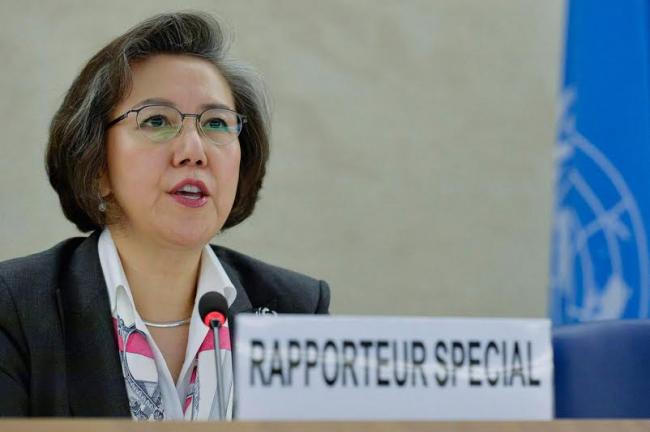12 Aug 2015, 05:53 am Print

“Civil society actors, journalists and ordinary citizens exercising their rights to freedom of expression, assembly and association are not threats; instead they are the voice of different communities and interests in Myanmar,” Yanghee Lee, UN Special Rapporteur on the situation of human rights in Myanmar highlighted in her end-of-mission statement.
As a key milestone in Myanmar’s transition to democracy, at the end of her visit to the country, Lee said that the forthcoming elections will be an opportunity to reaffirm and consolidate the reform process.
However, the possible disenfranchisement of civil society actors, refugees living in conflict zones, and previous temporary registration cards holders is of great concern, the human rights expert noted during her visit.
“To be truly free and fair, the elections must be inclusive and must truly reflect the will of the people,” said Lee, adding that “they play a vital role in contributing to and sustaining a robust democracy, and in advocating for the promotion and protection of human rights.”
As the ongoing conflict is holding off inclusive and peaceful elections, Lee emphasized the significance of fully integrating human rights issues, as well as engaging women in all stage of the peace process.
While regretting not being granted access to Rakhine state, where, she said “some serious human rights violations have occurred,” the expert raised particular concern over restrictions on the freedom of movement of the Muslim community, such as lacking access to basic health care, education and livelihoods.
“More must and can be done to address the legal status of the Rohingya and the institutionalized discrimination faced by this community,” she said, adding that improving education opportunities and access to higher education is a priority.
Lee’s visit was reduced by the Government from 10 days to five, with sudden cancelations of some requested meetings and visits. Despite her frustration on the changes, the human rights expert recommitted her engagement with the Government and all stakeholders.
Independent experts or special rapporteurs are appointed by the Geneva-based Human Rights Council to examine and report back on a country situation or a specific human rights theme. The positions are honorary and the experts are not UN staff, nor are they paid for their work.
Photo: UN Photo/Jean-Marc Ferré
- Viral Irish food bank photo sparks shocking racist attacks on Indians
- Caught on camera: Two foreigners assaulted in Israel in an alleged racial attack
- Pakistan: Parents heartbroken after court sides with man accused of kidnapping minor Christian girl
- Pakistan: Trafficked 35 years ago, Bangladesh-born woman approaches court against FIA for offloading her from flight!
- Hindu tea worker found bound and bloodied in Bangladesh garden during general elections; investigation underway





-1763561110.jpg)
